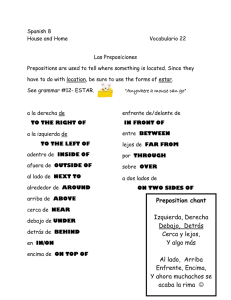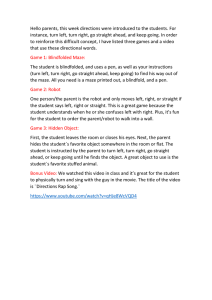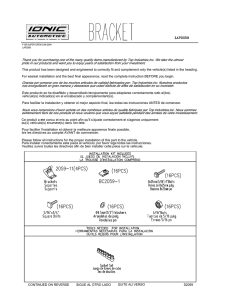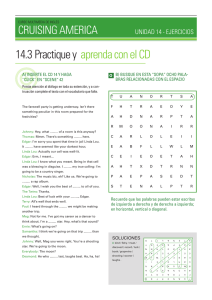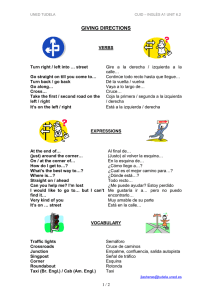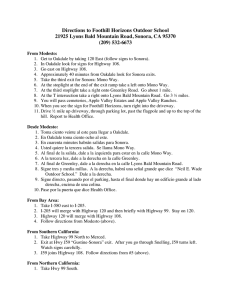GIVE DIRECTIONS AND FOLLOW SIMPLE INSTRUCTIONS
Anuncio
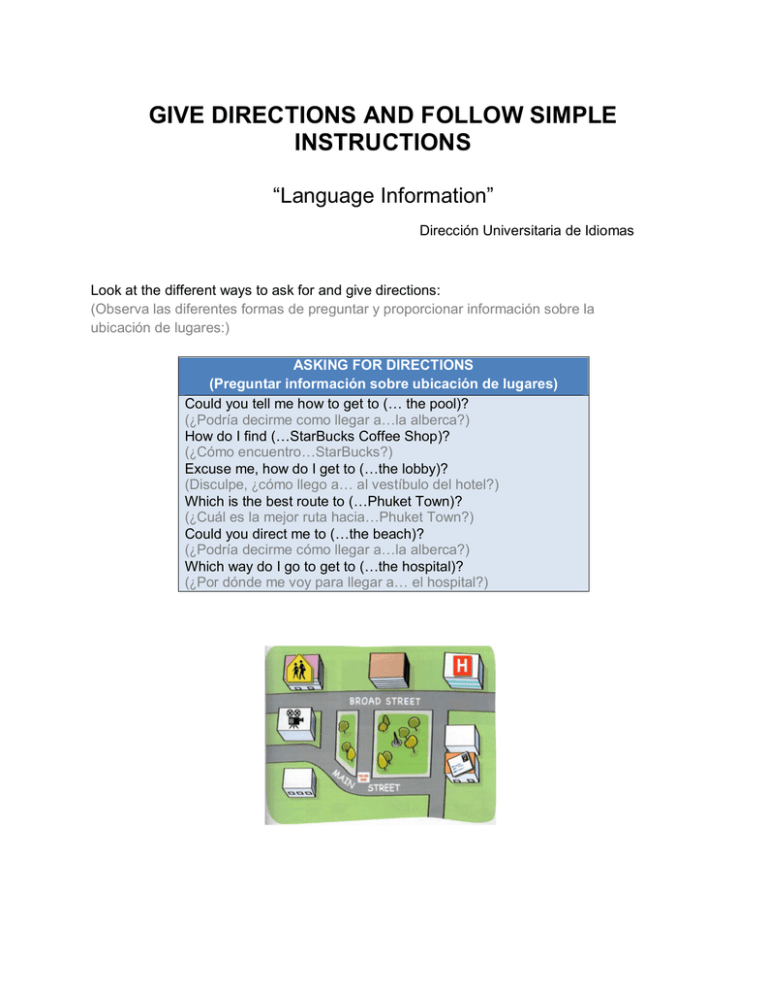
GIVE DIRECTIONS AND FOLLOW SIMPLE INSTRUCTIONS “Language Information” Dirección Universitaria de Idiomas Look at the different ways to ask for and give directions: (Observa las diferentes formas de preguntar y proporcionar información sobre la ubicación de lugares:) ASKING FOR DIRECTIONS (Preguntar información sobre ubicación de lugares) Could you tell me how to get to (… the pool)? (¿Podría decirme como llegar a…la alberca?) How do I find (…StarBucks Coffee Shop)? (¿Cómo encuentro…StarBucks?) Excuse me, how do I get to (…the lobby)? (Disculpe, ¿cómo llego a… al vestíbulo del hotel?) Which is the best route to (…Phuket Town)? (¿Cuál es la mejor ruta hacia…Phuket Town?) Could you direct me to (…the beach)? (¿Podría decirme cómo llegar a…la alberca?) Which way do I go to get to (…the hospital)? (¿Por dónde me voy para llegar a… el hospital?) GIVING DIRECTIONS (Proporcionar información acerca de la ubicación de lugares) Go up/down the steps Cross the street (Sube/baja las escaleras) (Cruza la calle) Go straight/along It’s on your right/left (Sigue derecho) (Está a tu derecha/izquierda) On your right/left It’s in the middle of the block (Hacia tu derecha/izquierda) (Está a la mitad de la calle) Turn right/left It’s on the corner (Gira a la derecha/izquierda) (Está en la esquina) It's on the third floor Drive south on 4233 (Está en el tercer piso) (Maneja al sur sobre la 4233) Follow this path It’s next to/across from/between/in front of (Sigue el camino) (Está a un lado/frente a/entre/enfrente de)) Turn right/left at the corridor Drive to Jackson street and turn left/right (Gira a la derecha/izquierda en (Maneja hacia la calle Jackson y gira a la el corredor) izquierda/derecha ) It’s about 50 meters Take the first right/left (Está a aproximadamente 50 (Toma la primera vuelta a la metros) derecha/izquierda) Go above 3 kilometers (Continua 3 kilómetros) * See the file “Places around Town” in the section Glossaries for further reference. (* Consulta el archivo “Places around Town” en la sección Glossaries para mayor referencia.) The most common prepositions used when giving directions are: (Las preposiciones mas comúnmente usadas para hablar acerca de la ubicación de lugares son:) PREPOSITIONS OF LOCATION USED WHEN GIVING DIRECTIONS (Preposiciones de lugar usadas para la ubicación de lugares) next to (al lado de) on your right (a tu derecha) beside (al lado) on your left (a tu izquierda) behind (detrás) far (lejos) across from (frente a) in front of (en frente de) on the corner of (en la esquina de) near (cerca) After reading this document, read and listen to the “Language Models” to see the expressions/phrases below in use. (Después de leer este documento, lee y escucha los “Language Models” para observar las expresiones/frases en uso.) When we give instructions, we usually use ‘sequence words’ to describe a process. (Cuando damos instrucciones, usualmente usamos ‘sequence words’ para describir un proceso.) First,… (Primero) Second,… (Segundo) Then,… (Entonces) Next,… (En seguida) Finally,… (Finalmente) We ask for and give instructions in a variety of contexts such as describing a recipe, explaining the rules for a board game, explaining the use for an electrical device, indicating fire safety regulations, giving directions, etc. (Nosotros pedimos y damos instrucciones in una variedad de contextos tales como describir una receta, explica las reglas de un juego, explicar el uso de un aparato eléctrico, indicar medidas de seguridad antiincendios, proporcionar información sobre la ubicación de lugares, etc.) When you give instructions, use very clear and direct language not to confuse the reader/listener. It is also a good idea to use pictures or diagrams to convey your ideas better. (Cuando das instrucciones, usa lenguaje muy claro y directo para no confundir al lector/oyente. También es buena idea usar imágenes o diagramas para transmitir tus ideas de una mejor manera.) REFERENCES Evans, V. and Doodley, J. (1997). Enterprise 1 Student’s Book. (New Edition 2000). Express Publishing. Evans, V. and Doodley, J. (1997). Enterprise 1 Workbook. (New Edition 2000). Express Publishing. Harmer, J., Lethaby, C. Acevedo, A., Wilson, K. (2005).Just Right Coursebook Elementary. Marshall Cavendish Education. Harmer, J., Lethaby, C., Acevedo, A., Wilson, K. (2005). Just Right Workbook Elementary. Marshall Cavendish Education. Mitchell, H.Q. and Scott, J. (2001). Channel Student’s Book Elementary. McMillan. Oxenden, C., Latham-Koenig, C., Seligson, P. (2005). New English File Elementary Student’s Book. Oxford. Oxenden, C., Latham-Koenig, C., Seligson, P. (2005). New English File Elementary Workbook. Oxford. Richards, J.C., Hull, J., Proctor, S. (1997). New Interchange 1 Student’s Book. Cambridge University Press. Sadzhaya, V. (2009).Great Values Student’s Book 1. Progreso Editorial. Sadzhaya, V. (2009).Great Values Workbook 1. Progreso Editorial. Vaughan Jones, S., Gomm, H., Maggs, P., Brown, C., Dawson, C. (2007). New Inside Out Student’s Book Elementary. Macmillan.
